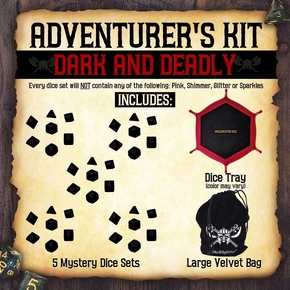
Kenku 5E - Dungeons and Dragons
Table of Contents:
Quoth the Raven
Kenku are cursed people, stripped of their flight and their true voices and left to wander the material plane. Introduced back in 3rd edition D&D as a simple cackling monster, kenku have now been given a fighting chance as a player race of their own. Flocks of kenku carve out territories among slums and downtrodden cities. Much like their raven kin, the bird-folk pinch and pilfer their way through life.
They are clever thieves of both coin and culture, lacking a creative voice of their own but perfecting the art of the mimic and forgery. Recently made even more popular due to Critical Role’s “Kiri”, the raven-folk are flocking to game tables around the world. Playing a kenku is a marvelous acting opportunity, as you cobble together your speech through stolen fragments and chaotic noise. Follow us deep into the criminal underbelly as we go through everything you need to know.
Kenku Culture
The actual origins of the kenku aren’t clear (largely due to conflicting lore between editions) but while the proper nouns may have changed around the story has the same notes. The kenku started as proper bird-folk with wings, creative talent, and a voice of their own. They served some sort of dark master and attempted to betray them by stealing some extremely important shiny bauble. The kenku were caught and given an all-mighty deity level punishment and were nerfed to oblivion, then they were let loose to wander around the material plane.
The result of all this is a deeply wounded culture that focuses on regaining what was lost.
Each kenku instinctually misses their ability to fly and their dreams take them skyward. Kenku flocks are drawn to high places, and since they rarely have any real resources of their own, they usually settle in ruined towers or high forgotten places amongst the city sprawl. Spells and magic items that provide flight are especially prized, and many kenku study magic explicitly to one day take to the sky.
Kenku have no empires or fortunes, they scrape their way by making use of what talents their people have left, mimicry and thieving. Each kenku can repeat the things they hear perfectly but have no voice of their own. They create their “vocabulary” out of words they’ve heard, and their speech is often choppy and segmented. This “lack of voice” applies to their artistic voice as well and kenku find it nearly impossible to create something new, a wound still aching from their ancestral curse. Without an artistic voice kenku remain a cultural echo, always on the edge but never forming a real culture of their own..
Kenku Appearance

Unlike most 5e races, kenku are limited in their appearance. Unlike aarakocra who get a wonderfully generic description of “like a bird”, kenku have a solidly raven-like appearance. You have a little wiggle-room in that the crow and raven family is a bit more varied than people realize. Crows, ravens and magpies all share quite a bit of stereotypical black feathers, but you can play around with mottled white and black patterns or the spectral iridescence of the finest raven feathers. You also have a range of themes to play with using a simple raven. The corvids encompass the arcane mysticism of a wizard’s familiar, the macabre mortality of the carrion birds, and the comical mischief of the mockingbirds.
The real jackpot of creative space lies not in your new kenku character’s appearance, but in their voice. As a kenku, your voice should be derived from words and sounds you’ve heard in the past. Well educated kenku may well speak fluidly and seamlessly, but a kenku thief off the street may well speak in fragments and sound effects. Nobody expects you to be a great voice actor but try coming up with some odd speech fragments for your new kenku, like phrases spoken with awkward or incorrect inflections or even by slipping the odd sound effect into your speech patterns. If done well this can be an amazing bit of roleplay, but make sure to knock it off if your fellow players seem annoyed.
Kenku Names
Kenku names are literally sound effects rather than something that can be written down. Their perfect mimicry means that a kenku’s name could be the bang of a gunshot, the gentle wind among autumn leaves, or the squeak of a rat. Kenku names have no regard for gender but do tend to relate to the kenku’s profession or role. Warriors will have names that relate to the sound of battle like a sword clang or the twang of a bowstring. Kenku within city underbellies usually use noises that can easily pass for alley animals, like rat scratches or pigeon coos. Finally, kenku with regular professions usually take a name related to it, such as ocean spraying for a sailor or the rustle of wood shavings for a carpenter
Obviously, nobody but kenku can reproduce these sounds, so they provide non-kenku with a literal translation. A kenku whose name is the sound of hammering would be “Hammerer”, and a kenku whose name is the sound of a sword slice would be called “Slicer”. The following list contains the literal non-kenku translations for many kenku names:
Kenku Names: Barker, Chewing, Clapper, Duck Quacks, Gnasher, Lute String, Mallet Smash, Mauler, Panda Sneeze, Potion Crash, Rat Squeak, Scrubber, Splitter, Tree Creak.
Kenku Traits
Your kenku character has the following racial traits.
Ability Score Increase: Your Dexterity score increases by 2, and your Wisdom score increases by 1.
Age: Kenku have shorter lifespans than humans. They reach maturity at about 12 years old and can live to 60.
Alignment: Kenku are chaotic creatures, rarely making enduring commitments, and they care mostly for preserving their own hides. They are generally chaotic neutral in outlook.
Size: Kenku are around 5 feet tall and weigh between 90 and 120 pounds. Your size is Medium.
Speed: Your base walking speed is 30 feet.
Expert Forgery: You can duplicate other creatures’ handwriting and craftwork. You have advantage on all checks made to produce forgeries or duplicates of existing objects.
Kenku Training: You are proficient in your choice of two of the following skills: Acrobatics, Deception, Stealth, and Sleight of Hand.
Mimicry: You can mimic sounds you have heard, including voices. A creature that hears the sounds you make can tell they are imitations with a successful Wisdom (Insight) check opposed by your Charisma (Deception) check.
Languages: You can read and write Common and Auran, but you can speak only by using your Mimicry trait.
Kenku don’t have a whole lot of abilities, but what they have does have a lot of applications. Let’s go through them one at a time.
Ability Score Increase: +2 to Dexterity and +1 to Wisdom is a solid boost for most Wisdom based classes and Dexterity based martial classes. Rangers, Clerics, Druids, Monks, Rogues, and Dexterity based Fighters are all excellent choices.
Age: Rarely matters in 5e but a little on the short side comparatively.
Alignment: Chaotic and typically self-centered, very unlikely to be really logical or to act as the voice of reason.
Size: They’re on the small side of medium, but still standard-sized, nothing to note really.
Speed: Stock standard 30-foot movement, still better than a penalty.
Expert Forgery: I feel like this was intended as a stronger ability but in practice it rarely comes up and doesn't help as much as it should. You don’t gain any special tool proficiencies here, so if you plan on copying a key or some important bauble you better have the tool set and proficiency to do so. This feature gives you advantage on the forgery checks you attempt, but you’re not actually getting the ability to attempt them.
Kenku Training: Bonus skill proficiencies are a godsend and you get to choose two from some of the best. Grab whichever proficiencies aren’t already granted by your class and background.
Mimicry: This is the iconic ability that the whole kenku identity is wrapped around. Sadly, it’s not great, it’s good, but the developers seemed to weigh it pretty heavily. You get to mimic sounds perfectly, note though that you don’t gain the ability to throw your voice or project in any way. It’s obviously an ability designed for sneaky rogues and general subterfuge. Really though, it usually ends up being used to confuse the odd guard and little else. Mimicry has a HUGE amount of potential, from impersonating important NPCs to adding the convincing sound effects to even minor illusions, it just depends on how creative you get with it and how creative your DM allows you to be.
Languages: Common and Auran, though you can only talk in mimicry. Auran is a pretty rare language so it’s not likely to come up in most adventures.
Kenku Builds
5e D&D is amazingly flexible, and no class or background you pick for your next kenku character will be “wrong”. However, if you’re interested in optimization, the following build ideas can be great starting points for your next adventurer:
Graveyard Raven
Rogues are already a thematic fit for kenku, but the new rogue subclass “The Revived” fits even better and has excellent synergy with the kenku expert forgery ability. Revived rogues gain an ability called tokens of past lives that lets them trade out a new tool or skill proficiency every long rest. Odd tool proficiencies are the missing piece of the forgery puzzle. Need jeweler's tool proficiency to make a fake of that signet ring or smith’s tools to replicate that key? Bam, just give it a long rest and you’ll know how to use whichever tool is right for the job, then get advantage on using it.
Swooping Crane
Their lore doesn’t make a lot of sense for monks, but the bonus to Dexterity and Wisdom lines up perfectly. The kenku abilities will allow you to play your monk more stealthily, scouting out the opponents and perhaps misleading them away from your allies. It’s a strange synergy, but it works.
Twin Birds
Kenku abilities already line up nicely with clerics and their stealthy abilities mix nicely with the trickery domain. You’ll end up playing a cleric that can also play a lot of the rogue’s role, so it’s a great pick if your party lacks both and you want to supply them both. The invoke duplicity ability is also amazing with your mimicry ability, since you can use it in conjunction with minor illusion both your “voice” and your copy’s “voice” will be identical. Have fun confusing the guards with your doppelganger bird.
👉 SHOP KENKU MINIATURES HERE!
--
Enjoy this Guide? You May Also Like:
Tabletop and RPG gamers agree that we have the dice sets. They're perfect as a gift or for yourself. Get your clicky clack math rocks today!
Thinking about other classes? Check out our giant list of D&D 5e Tools and Tips here.
New to find a D&D Group? Find a D&D Group using our guide.
Ever wanted to be a vampire? Then you'll love our Dhampir 5e Guide
Our Complete Magic Item Guide HERE.
Want a character that makes magic items? Check out our Artificer 5e Guide!
DM's strike terror into your party with our Red Dragon 5e BBEG Guide
DO I GIVE THEM THE RED POTION OR THE REALLY RED POTION? Know before you throw with our Healing Potions in DND 5e Guide
Check out the reptilian like race in our Lizard Folk 5e guide
Want to play a lethal ninja? Dance the blade's edge with our Monk Rogue 5e multiclass guide
Want to be a rugged frontier adventurer? Check out our Ranger 5e Multiclass Guide
Want to always get your sneak attack? Check out our Artificer Rogue Multiclass Guide for details on how to make this happen.
Become Kung Fu Panda with our Monk Druid 5e Multiclass Guide
Want to wield two swords like Drizzt? Check out our Two Weapon Fighting 5e Guide!

Disclaimer
Last updated: January 27, 2019
The information contained on www.SkullSplitterDice.com website (the "Service") is for general information purposes only.
www.SkullSplitterDice.com is a participant in the Amazon Services LLC Associates Program, an affiliate advertising program designed to provide a means for sites to earn advertising fees by advertising and linking to Amazon.com. (source: Section 5)
Blueshift Nine, LLC assumes no responsibility for errors or omissions in the contents on the Service.
In no event shall Blueshift Nine, LLC be liable for any special, direct, indirect, consequential, or incidental damages or any damages whatsoever, whether in an action of contract, negligence or other tort, arising out of or in connection with the use of the Service or the contents of the Service. Blueshift Nine, LLC reserves the right to make additions, deletions, or modification to the contents on the Service at any time without prior notice.
Blueshift Nine, LLC does not warrant that the Service is free of viruses or other harmful components.
Affiliate disclaimer
This affiliate disclosure details the affiliate relationships of Blueshift Nine, LLC with other companies and products.
Some of the links are "affiliate links", a link with a special tracking code. This means if you click on an affiliate link and purchase the item, we will receive an affiliate commission.
The price of the item is the same whether it is an affiliate link or not. Regardless, we only recommend products or services we believe will add value to our readers.
By using the affiliate links, you are helping support the Service, and we genuinely appreciate your support.
Affiliate advertising programs that the Service uses are:
- Amazon Services LLC Associates Program
- As an Amazon Associate, I earn from qualifying purchases.
- Blueshift Nine, LLC is a participant in the Amazon Services LLC Associates Program, an affiliate advertising program designed to provide a means for sites to earn advertising fees by advertising and linking to Amazon.com or endless.com, MYHABIT.com, SmallParts.com, or AmazonWireless.com.
- Pages on this Service may include affiliate links to Amazon and its affiliate sites on which the owner of this Service, Blueshift Nine, LLC, will make a referral commission.





